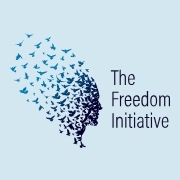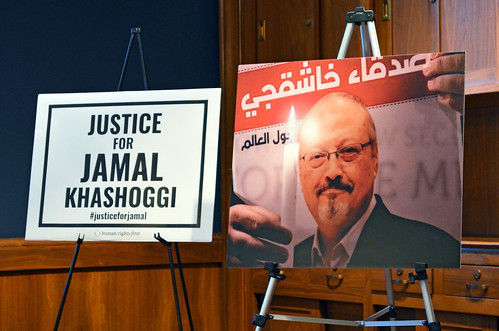To mark the one-year anniversary of Jamal Khashoggi’s brutal murder, POMED and 12 other human rights and press freedom organizations held a public event on Capitol Hill to commemorate Jamal’s life, to call for accountability, and to cast a light on the Saudi government’s repression of those who are perceived to be critical of Crown Prince Mohammed bin Salman and his regime.
Thursday, September 26, 2019
9:00 am – 11:00 am
Dirksen Senate Office Building, Room G-11
50 Constitution Ave NE, Washington, DC
Featuring
Sen. Bob Menendez (D-NJ)
Sen. Tim Kaine (D-VA)
Sen. Chris Murphy (D-CT)
Sen. Chris Van Hollen (D-MD)
Sen. Ron Wyden (D-OR)
Rep. Steve Chabot (R-VA)
Rep. Gerry Connolly (D-VA)
Rep. Ro Khanna (D-CA)
Rep. Tom Malinowski (D-NJ)
Rep. Jim McGovern (D-MA)
Rep. Dean Phillips (D-MN)
U.N. Special Rapporteur Agnès Callamard
Lina Al-Hathloul
Areej Al Sadhan
Colonel Lawrence Wilkerson (Ret.)
Sponsored by
Americans for Democracy & Human Rights in Bahrain
Amnesty International
Article 19
Committee to Protect Journalists
Freedom House
The Freedom Initiative
Human Rights First
Human Rights Watch
James W. Foley Legacy Foundation
PEN America
Project on Middle East Democracy
Reporters Without Borders
Robert F. Kennedy Human Rights
With
Monica Zuraw, Americans for Human Rights & Democracy in Bahrain
Philippe Nassif, Amnesty International
Justin Shilad, Committee to Protect Journalists
Margaux Ewen, James W. Foley Legacy Foundation
Andrea Prasow, Human Rights Watch
Karin Deutsch Karlekar, PEN America
Stephen McInerney, Project on Middle East Democracy
Below are excerpts from some of the speakers at the event.
[5:15] Senator Chris Van Hollen (D-MD):
We’re not going to rest until the crown prince and others are held accountable for this murder, because failure to hold him accountable in the long run breeds this impunity, a sense that you can get away literally with murder. And that puts American residents at risk, American citizens at risk, and it puts journalists around the world at risk, and people who are living in these authoritarian countries who are fighting every day for their rights.
[9:48] Senator Tim Kaine (D-VA):
Jamal Khashoggi was a constituent, he was a Virginia resident. His children are not just residents, but citizens of the United States, and citizens of Virginia. He was a journalist. He’s not the only Virginian who has been treated harshly by the Saudi government. Aziz al-Yousef, the prominent women’s rights activist who was imprisoned because of her role in organizing campaigns for example for the radical notion that women should be able to drive or that women should not be subject to the guardianship rules that disable them from making the common everyday decisions of life. Aziz al-Yousef studied at the Virginia Commonwealth University. Her son is a U.S. citizen who is a Virginia resident. He’s also been imprisoned for his role in trying to help women’s rights activists.
[17:48] Representative Steve Chabot (R-OH):
I never had the pleasure to meet Jamal, but I know that he was an independent voice who tirelessly urged greater openness and reform no matter the cost, and, as we now know, it ultimately cost him his very life… I would ask that we all pause and not only remember Jamal but also remember all the other countless journalists across the globe who are still being persecuted for merely attempting to tell the truth.
[21:50] Agnès Callamard, UN Special Rapporteur on extrajudicial, summary, or arbitrary executions:
The grave implication of the crimes extend in my view far beyond the authority of the courtroom alone, and other pathways must be pursued: political, economic, symbolic. Justice in the short term; justice in the long term. And justice of this order takes time. A single year’s effort is but the first phase in this journey… No country should be able to buy their way out of accountability, no matter their influence, strategic relevance, no matter the nature of their friendship.
[32:40] Representative Gerry Connolly (D-VA):
It speaks horrible volumes about Saudi government that it would go to such incredible lengths to take out a moderate voice of change. It shows an insecurity that ought to give everybody pause about the stability of the Saudi government. It also says to us that our work must continue not only for justice for Jamal but for freedom of the press. Is every member of the press who dares to criticize another government, even if it’s their own government, at risk of their lives in such a brutal and grizzly fashion?
[41:12] Senator Bob Menendez (D-NJ):
The murder of Jamal Khashoggi will be remembered as the straw that broke the camel’s back. The Saudis should have known that brazenly murdering an American resident and journalist would trigger a fundamental reexamination of the U.S. relationship with Saudi Arabia. The refusal of President Trump to hold those responsible for Khashoggi’s death accountable, including Saudi Crown Prince Mohamed bin Salman, has turned this crime into an assault on fundamental American values—like freedom of the press, democracy, and the rule of law.
[48:29] Representative Tom Malinowski (D-NJ):
This was not just an awful, horrific crime committed against one man, albeit a man who was known and cared for by many people in this room. This was an affront to the United States of America; it was an attack on freedom of expression; it was an assault on the idea that if a dissident finds safe exile in a third country that they should be, in fact, safe from extraterritorial killing.
[55:47] Representative Jim McGovern (D-MA):
Here’s the bottom line. Instead of justice for Jamal, this administration is helping the Saudi government get away with murder. They ought to be ashamed of themselves. They are complicit, based on their inaction. They don’t just have blood on their hands, they have blood up to their elbows. There comes a point when Congress must stand up and insist on consequences for such brutality, for operating so far outside the norms of international behavior. And it is not just Jamal, it is so many dissidents that are in Saudi prisons, who have no business being in Saudi prisons. We demand that they be released immediately.
[1:01:25] Lina Al-Hathloul, sister of detained human rights activist Loujain Al-Hathloul:
I mean, it was not a democracy before that, but there was more space in the public sphere for citizens to ask for reforms… Basically, it is really becoming a police state. What can you do about it? Talk about it every time Saudi Arabia is in the subject. Talk about these arrests. Ask questions, call for action. Most importantly, I beg you, never forget.
[1:06:10] Areej Al Sadhan, sister of detained Red Crescent employee Abdulrahman Al Sadhan:
I ask world leaders and human rights organizations to have a stronger stand against these violations. And as an American citizen, I kindly ask for your help and to demand the Saudis to allow us to have access to my brother. To check on him and to ask for his immediate and unconditional release, to join his family, as we all have suffered enough. Also, to hold those involved in exercising enforced disappearance and torture of my brother and others accountable for their inhumane actions.
[1:11:51] Col. Lawrence Wilkerson (Ret.):
We are latched to, we are allied with, one of the bloodiest tyrants on the face of the Earth. And the things that I had to do my planning for in the ’80s and ’90s—like oil, and buying U.S. dollars, and denominating oil sales in dollars, and buying U.S. treasuries and so forth—are no longer adequate rationalization for that alliance. They simply aren’t. Not when the kinds of things that are happening today are happening… We need, desperately even, to begin to distance ourselves from this kingdom, we need to distance ourselves from what it represents and what it does, particularly in this brutal war in Yemen, and we need to readjust our sights accordingly. And that’s from a military professional turned diplomat.
[1:19:35] Senator Ron Wyden (D-OR):
So, we’re going to try to finally get the Director of National Intelligence to tell us what they know, so we can hold this administration and the crown prince accountable… Normally Senators say that they’re for something, but when the administration stonewalls that’s pretty much the end of the discussion. Well, if they stonewall, they are in for a fight they will remember for the rest of their lives.
[1:25:55] Representative Dean Phillips (D-MN):
We cannot let a murder such as his go unaccounted for, we must hold Saudi Arabia responsible and accountable for the horrific action. We must refuse to support the Saudi government’s suppression of its critics, and we must use our relationship with Saudi Arabia to strengthen human rights and freedom of information. Most importantly, we cannot let a sacrifice such as Jamal’s go to waste. We must continue to work for what he stood for every single day, supporting free press all around the world, including in this country, fighting corruption and disinformation, and always seeking out and exposing the truth.
[1:35:38] Senator Chris Murphy (D-CT):
You have to do something to deserve to be an ally of the United States. And my take was that Saudi Arabia for a very long time had been doing far too many things that were contrary to both U.S. national security interests and our values sets that should cause us to reevaluate the nature of that friendship. What I didn’t know at the time was that the government of the Kingdom of Saudi Arabia was not limiting their campaign of repression to the territory inside their borders. That in fact they were chasing down dissenters and journalists all over the world to try to intimidate and bully them into adopting the royal family’s line. I was really saddened when I saw our Secretary of State travel to Riyadh to meet with the Crown Prince after the revelations regarding the murder came to light. The Saudis should be coming to us to apologize for kidnapping a journalist under U.S. protection rather than the world watching us travel there to present a smiling press conference in an attempt to paper over this gross violation of human rights.
[1:43:37] Representative Ro Khanna (D-CA):
Mr. Khashoggi was murdered because he spoke out against the catastrophic war in Yemen. He had the guts to call out Saudi barbarity in Yemen, which could be one of the largest famines in world history. And the way to honor him is to insist on stopping the war in Yemen.


